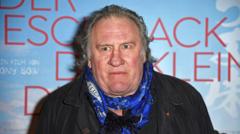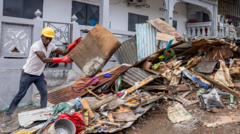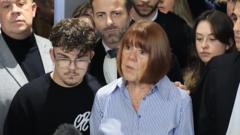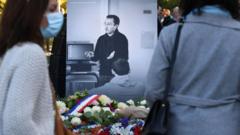Gerard Depardieu faces trial in Paris for allegations of sexual assault against two women. As France's #MeToo movement gains momentum, this high-profile case stirs deep divisions within the film community and society. With claims of false accusations and calls for more scrutiny of violence against women, the outcome of this trial may significantly influence public discourse around consent and accountability in artistic circles.
Gerard Depardieu's Sexual Assault Trial: A Test Case for #MeToo in France

Gerard Depardieu's Sexual Assault Trial: A Test Case for #MeToo in France
The trial of the renowned French actor Gerard Depardieu begins amid serious allegations and intense media scrutiny, posing critical questions about the #MeToo movement's impact in France.
Gerard Depardieu is poised to stand trial in Paris, confronting serious allegations of sexual assault that have emerged as one of the most significant cases in the #MeToo movement in France. The 75-year-old actor faces accusations from two women who allege that he assaulted them during the filming of "Les Volets Verts" (The Green Shutters) in 2021. Prosecutors charge that Depardieu made explicit sexual advances and allegedly "groped" the production team members. If found guilty, he could face a five-year prison sentence.
Depardieu denies the allegations, previously stating in an open letter that he has never "abused a woman." As his trial date approached, his attorney requested a postponement, citing health concerns that prevented the actor from attending. Jeremie Assous, his lawyer, expressed that Depardieu is deeply affected by the situation and is currently under medical advice to avoid court proceedings.
The trial marks a crucial chapter for the French #MeToo movement, as it involves one of the most prominent figures in French cinema facing serious sexual assault claims. The accusers remain unnamed but have stated that they were subject to unwanted sexual comments and unwanted physical contact.
In a cultural context that remains polarizing, Depardieu's legal team has cast doubt on the allegations, alleging that one complainant's motivations include a potential financial gain of €30,000 ($32,500) in compensation, as reported by Le Monde. The actor has faced a deluge of accusations—over a dozen women have come forward to share their experiences, complicating his public image and professional prospects.
In light of these allegations, Depardieu has virtually vanished from the cinematic landscape, with no new roles since 2022. He is also expected to face a second trial next year over accusations of rape concerning actress Charlotte Arnould at his residence.
Despite the serious nature of the allegations, Depardieu has found some support among members of the French artistic community. Over 50 prominent figures, including actors and singers, have signed a letter declaring that the accusations against him represent an "attack on art itself." They describe a culture of "lynching" directed toward Depardieu and vocally defend his character.
The controversy has also drawn attention from political leaders, including French President Emmanuel Macron, who controversially labeled Depardieu as "the pride of France." These comments have sparked backlash, with proponents of women's rights arguing that they diminish the importance of addressing violence against women. Actress Léa Seydoux has criticized Macron's stance, deeming it "crazy" and harmful to France's image.
While Macron's administration has shown support for Depardieu, the then-culture minister, Rima Abdul-Malak, proposed reviewing his Legion d'Honneur status following resurfaced footage where he made inappropriate comments to women in a past documentary filmed in North Korea.
As the trial begins, it embodies the ongoing struggle between cultural legacy, artistic freedom, and the imperative to safeguard the rights and dignity of women. The verdict could have profound implications not only for Depardieu's future but also for the evolving landscape of #MeToo in France and beyond.




















